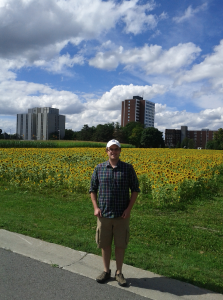 |
| Pete Anderson posing near the threatened experimental plots with the Civic Hospital in the background. Photo credit: Laura Cameron. |
Sunday 23 November 2014
Crosspost: Vacating Science and Forgetting History at the Central Experimental Farm
This post originally appeared at Active History. As always, please leave comments at the original.
On November 3rd, John Baird announced
that Agriculture and Agri-Food Canada transferred approximately 24
hectares (60 acres) of the Central Experimental Farm, in Ottawa, to the
National Capital Commission. The NCC in turn offered to lease the land
to the Ottawa Hospital to build a new Civic Campus. The Hospital then mused about the using this new land as a parking lot.
Saturday 15 November 2014
Hulme: Human Geography and the Many Voices of Climate Change
On Thursday, November 13th and Friday, November
14th Mike Hulme gave two public lectures at Carleton University. Hulme is a
Professor of Climate and Culture in the Department of Geography at University
of King’s College and after a career working as a climatologist at the
University of East Anglia is now making a transition to being a human (and in
particular a cultural) geographer.
Friday 14 November 2014
Op-ed: Protect the Central Experimental Farm
 |
| Central Experimental Farm looking towards the Windfield Towers, Personal Photograph. |
My op-ed arguing against the development of the Central Experimental Farm, even for a hospital, can be found at the Ottawa Citizen. Please leave any comments on the original post.
Crosspost: Graduate School and the Consulting Historian
This
was originally posted at History@Work, the blog of
the National Council for Public History. Please leave comments at the original.
Academic
careers are hard to come by these days. Public historians will not be surprised
by the posts on the active #altac hashtag on Twitter or the Social Science
and Humanities Research Council of Canada’s (SSHRC) recent “White Paper on the Future of the PhD in the Humanities”
that observed that only between 10 and 15 percent of those who enter PhD
programs will be employed at a post-secondary institution [1]. A declining
number of tenured and tenure-track positions, coupled with an increased
reliance on precarious labor in the form of adjunct and temporary appointments,
has destabilized the academic job market for graduates. Deep budget cuts to
museums, archives, and other research-oriented institutions–not just in history
and the humanities, but also in the social, physical, and life sciences–make
finding “traditional” public history jobs increasingly difficult as well.
Labels:
Consulting,
NCPH,
Public History,
Research
Subscribe to:
Posts (Atom)